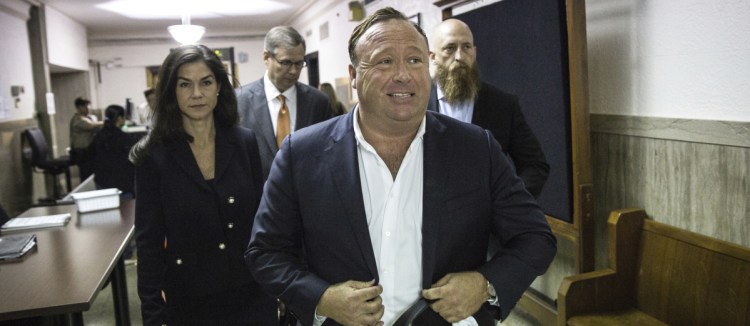Calling Alex Jones a “conspiracy theorist” is not fair to the word “theory.”
Evolution is a theory. Relativity is a theory. Claiming that the government controls the weather or that Hillary Clinton runs a child prostitution ring are not theories: They are lies or delusions, and in either case, no publication has any obligation, legal or moral, to publish them.
If Jones had written his ravings in chunks of 300 words or fewer and submitted one of them to this newspaper as a letter to the editor, we would have laughed and thrown it in the trash. The First Amendment guarantees him freedom of speech, but it doesn’t oblige us to amplify it or shield anyone from the consequences that arise when real people are harmed by his words.
But Jones did not submit his “theories” to newspapers. He used the high-tech platforms created by Facebook, Apple and YouTube, where he got no editorial interference for years and was able to build a giant audience.
That changed last week. With Jones facing multiple defamation suits, the tech giants banned his videos and podcasts, saying in slightly different ways that the sometimes racist and anti-Semitic material violated their policies regarding hate speech, harassment and the glorification of violence.
That’s a lot of fuzzy language invoking standards that would be hard to enforce consistently.
It would have been much clearer if the tech giants did what any publisher would have done and said Jones says things that are false and defamatory while displaying a reckless disregard for the truth.
In other words, he’s a walking slander suit and anyone who wants to help him spread the word should be ready to defend themselves in court.
But the tech companies don’t want to use that reasoning because they want to claim that they are not media companies. They say they are only neutral platforms for people to share content, and they are not responsible for what their users choose to send out into the world.
It’s a sweet deal for them. These sites make billions of dollars selling ads that are shown to people who visit them. The longer users stay online, the more money the sites make and the companies have spent millions trying to make the experience as addictive as possible. They keep track of our interests and program algorithms to feed us more and more of what we have already let them know we like. If it’s gardening, we get more gardening. If it’s comedy skits, we get more of those. If it’s “the government pretended to kill kids that never existed at the fake Sandy Hook elementary school, because a Kenyan revolutionary named Obama wanted to take away our guns,” that’s what we get more of.
The tech giants have built a machine that can cause great harm, and they have managed to insulate themselves from the legal consequences that could arise when people use their platforms as weapons.
That is an invitation for reckless misinformation and devious disinformation designed to create chaos. Jones is not the only one who thrives in this lawless environment and he will be easily replaced.
Until the courts treat these tech billionaires like the publishers that they are, and hold them responsible for the damage caused by the content off which they profit, there will be plenty of people willing to fill the void with “theories” of their own.
Send questions/comments to the editors.


